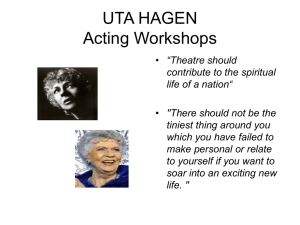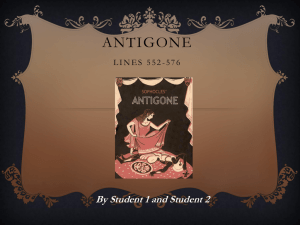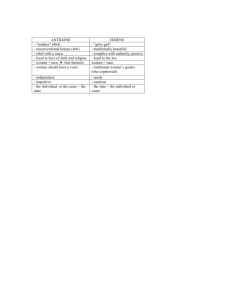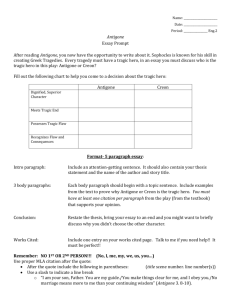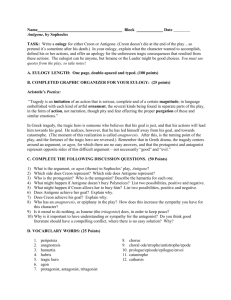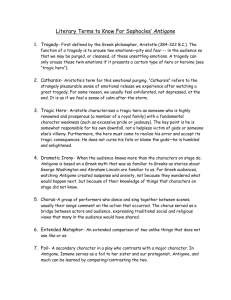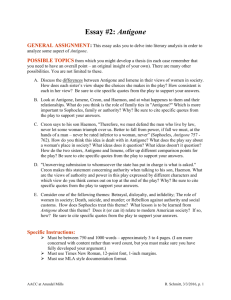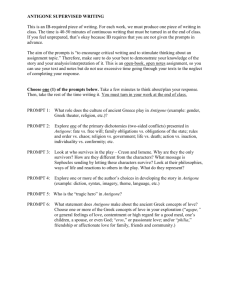1. In lines 1–6, the author what mood does the author create? 2
advertisement
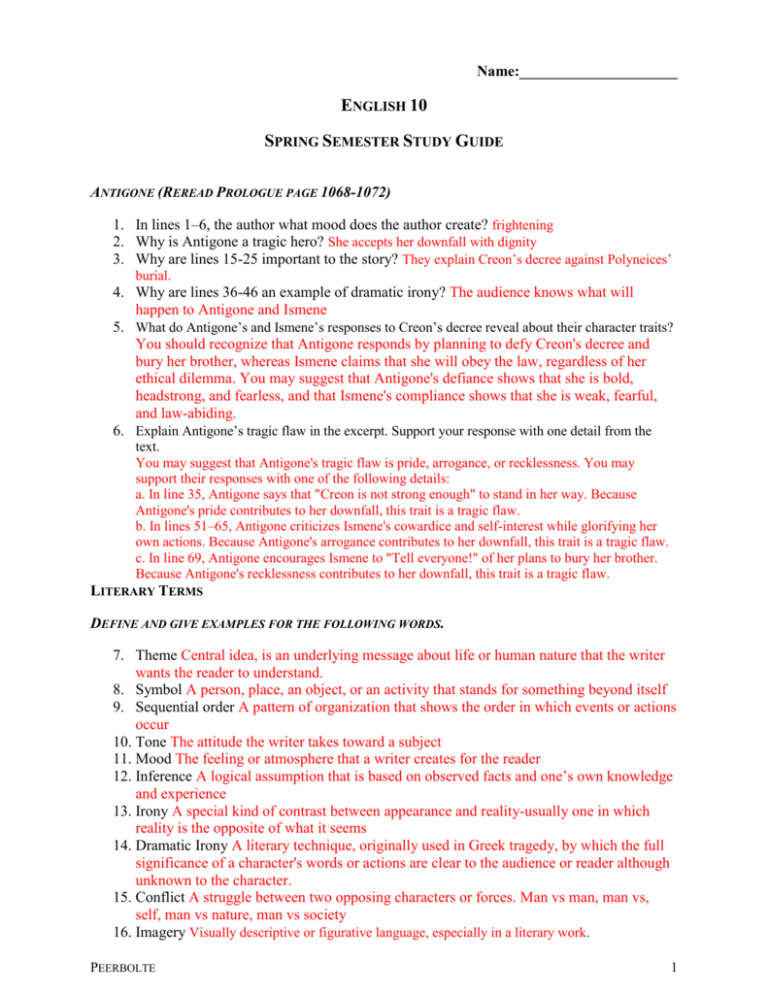
Name:_____________________ ENGLISH 10 SPRING SEMESTER STUDY GUIDE ANTIGONE (REREAD PROLOGUE PAGE 1068-1072) 1. In lines 1–6, the author what mood does the author create? frightening 2. Why is Antigone a tragic hero? She accepts her downfall with dignity 3. Why are lines 15-25 important to the story? They explain Creon’s decree against Polyneices’ burial. 4. Why are lines 36-46 an example of dramatic irony? The audience knows what will happen to Antigone and Ismene 5. What do Antigone’s and Ismene’s responses to Creon’s decree reveal about their character traits? You should recognize that Antigone responds by planning to defy Creon's decree and bury her brother, whereas Ismene claims that she will obey the law, regardless of her ethical dilemma. You may suggest that Antigone's defiance shows that she is bold, headstrong, and fearless, and that Ismene's compliance shows that she is weak, fearful, and law-abiding. 6. Explain Antigone’s tragic flaw in the excerpt. Support your response with one detail from the text. You may suggest that Antigone's tragic flaw is pride, arrogance, or recklessness. You may support their responses with one of the following details: a. In line 35, Antigone says that "Creon is not strong enough" to stand in her way. Because Antigone's pride contributes to her downfall, this trait is a tragic flaw. b. In lines 51–65, Antigone criticizes Ismene's cowardice and self-interest while glorifying her own actions. Because Antigone's arrogance contributes to her downfall, this trait is a tragic flaw. c. In line 69, Antigone encourages Ismene to "Tell everyone!" of her plans to bury her brother. Because Antigone's recklessness contributes to her downfall, this trait is a tragic flaw. LITERARY TERMS DEFINE AND GIVE EXAMPLES FOR THE FOLLOWING WORDS. 7. Theme Central idea, is an underlying message about life or human nature that the writer wants the reader to understand. 8. Symbol A person, place, an object, or an activity that stands for something beyond itself 9. Sequential order A pattern of organization that shows the order in which events or actions occur 10. Tone The attitude the writer takes toward a subject 11. Mood The feeling or atmosphere that a writer creates for the reader 12. Inference A logical assumption that is based on observed facts and one’s own knowledge and experience 13. Irony A special kind of contrast between appearance and reality-usually one in which reality is the opposite of what it seems 14. Dramatic Irony A literary technique, originally used in Greek tragedy, by which the full significance of a character's words or actions are clear to the audience or reader although unknown to the character. 15. Conflict A struggle between two opposing characters or forces. Man vs man, man vs, self, man vs nature, man vs society 16. Imagery Visually descriptive or figurative language, especially in a literary work. PEERBOLTE 1 17. Point of view Refers to the method of narration used in a short story, novel, narrative poem, or work of nonfiction 18. Plot The sequence of events in a story. It typically develops in five stages: exposition, rising action, climax, falling action, and resolution. 19. Connotation The author’s implied meaning of the word 20. Protagonist The leading character or one of the major characters in a drama, movie, novel, or other fictional text 21. Antagonist A person who actively opposes or is hostile to someone or something; an adversary 22. Simile A comparison of two things (that may or not be alike) using the words like or as. 23. Metaphor A comparison of two unlike things without using like or as. 24. Character a. Round Complex and undergo development, sometimes sufficiently to surprise the reader. b. Flat Two-dimensional in that they are relatively uncomplicated and do not change throughout the course of a work. RESEARCH PAPER Characteristics of a WEAK thesis statement Vague: Raises an interesting topic or question but doesn’t specify an argument Offers plot summary, statement of fact, or obvious truths instead of an argument Offers opinion or conjecture rather than an argument (cannot be proven with textual evidence) Is too broad or too complex for the length of the paper Uses meaningful‐sounding words but doesn’t say anything Characteristics of a STRONG thesis statement Answers a specific question Takes a distinct position on the topic Is debatable (a reasonable person could argue an alternative position) Appropriately focused for the page length of the assignment Allows your reader to anticipate the organization of your argument Directions: Carefully read the writing prompt and the Weak Thesis Statement. Then, rewrite a Good Thesis Statement. State the subject and tell the author’s purpose for writing or the point to be proved. Writing Prompt: Describe how television commercials influence children. Weak: Television commercials have an influence on children. Good: Writing Prompt: Explain why young people especially enjoy hobbies. Weak: One hobby many young people especially enjoy is reading. Good: Writing Prompt: Discuss the benefits of playing team sports. Weak: Playing team sports has many benefits. PEERBOLTE 2 Good: SHORT ANSWER 25. Label and define all parts of the plot triangle. Falling Action Rising Action Characters Exposition Climax Resolution Setting Conflict f. Climax e. Rising Action g. Falling Action d. Conflict a. Characters b. Setting h. Resolution c. Exposition Falling Action: the events that happen after the climax that lead to a resolution or ending to the story. Exposition: the introduction introduces the characters, describes the setting and establishes the problem in the story. Setting: Where the story takes place Rising Action: where the suspense builds and the problem gets worse and becomes more complicated Climax: the turning point in the story. It is usually the most exciting part in the story and the part that makes the reader want to keep reading Conflict: a struggle between two opposing forces Characters: The main people in the story Resolution: the outcome of the story. It is how things end up or turn out for the characters PEERBOLTE 3
